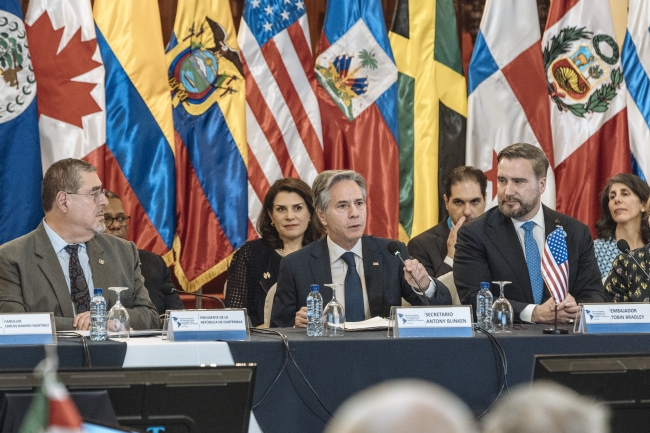SECRETARY BLINKEN: Thank you very much. And President Arévalo, thank you so much. Thank you for bringing us together today. Thank you for your leadership, not only in tackling migration challenges across our hemisphere, region, but also in working so hard to address the root causes of irregular migration here at home in Guatemala. We are proud to stand with Guatemala as a democratic partner committed to the rule of law, committed to responsive governance that actually delivers results for people.
And to my friend and colleague, the foreign minister, thank you as well for your partnership.
It’s wonderful to see so many friends, so many colleagues around this table from all across the hemisphere that we share. Two years ago, nearly two dozen nations signed the Los Angeles Declaration on Migration and Protection. The L.A. Declaration recognized that irregular migration affects each of our countries, as the President said, and that each of us has a responsibility to help address it – and to do it together.
Since then, together, we have partnered to transform our hemisphere’s approach to this truly historic challenge.
We’ve taken meaningful steps to expand lawful migration pathways as an alternative to irregular migration, to improve enforcement efforts, to support host communities, to strengthen protections for vulnerable populations.
Countries like Colombia, Ecuador, Peru have provided legal status to millions of Venezuelans who are – and are helping them contribute to host communities through U.S.-supported integration centers. Mexico and Canada established new labor pathways for migrants, helping workers build skills and economies grow. Colombia, Panama, Guatemala, Honduras stepped up efforts to counter human smuggling. And just yesterday, the United States and Costa Rica set up a Biometric Data Sharing Partnership that will deepen our collaboration on this critical priority.
At the core of our efforts is the message that individuals should take advantage of lawful pathways rather than make the dangerous journey north. Last summer, we came together to set up Safe Mobility Offices in Guatemala, Colombia, Costa Rica, Ecuador – providing screening and referral information to individuals where they are.
Since the program’s launch, we’ve settled – resettled over 7,500 refugees in the United States, and another nearly 20,000 individuals have been approved for various other legal pathways. And this is only the beginning. We are on track to resettle six times more individuals this year than last year.
The United States will continue to contribute solutions to the shared challenges that we face from irregular migration and displacement.
We’re supporting local efforts to help people remain safely in their own countries by addressing the root causes that drive people to move. Under President Biden, we’ve provided more than $6.3 billion for development, economic, health, security assistance all across the Western Hemisphere.
Over the same period, we’ve invested another 3.9 billion in humanitarian assistance to help migrants and displaced persons who do leave their homes integrate into their host communities.
Today, on top of these investments, we’re announcing our commitment to work with our Congress to provide an additional $578 million to assistance – in assistance to host countries across the Western Hemisphere, including humanitarian aid – providing water, shelter, sanitation, emergency health care to migrants and refugees who are in need.
The Biden administration has also led one of the largest expansions of lawful pathways for migrants. We’ve implemented new humanitarian parole processes for Cubans, Haitians, Nicaraguans, Venezuelans, and we’ve helped more than 400,000 individuals lawfully come to the United States.
We also established new family reunification parole processes for the nations of – nationals of Ecuador, El Salvador, Guatemala, Honduras, and Colombia, and updated these same processes for Cubans and Haitians. We’ve raised our target for refugee resettlement to 125,000 people a year, with up to 10,000 – or excuse me – 50,000 coming from our own hemisphere. And we’ve increased the number of H-2 temporary worker visas, which is a critical part of increasing lawful labor pathways.
We’ve stepped up efforts against those preying on vulnerable migrants. In February, we announced a new visa restriction policy that targets individuals who knowingly provide transportation to those intending to migrate irregularly to the United States, including through charter flights arriving in Nicaragua. Yesterday, we announced visa restrictions on executives of Colombian maritime migration companies who were facilitating irregular migration.
We’re redoubling our efforts to protect migrant workers from exploitation. The United States is joining the International Labor Organization’s Fair Recruitment Initiative, which helps ensure that cross-border recruitment efforts promote gender equality and prevent human trafficking and forced labor. We encourage others to join this initiative as well.
President Biden is committed to further building our partnership under the Los Angeles Declaration. This includes stepping up our shared ownership of the declaration – including by putting in place a formal coordinating body with a secretariat. This support will help sustain our efforts to put the declaration’s principles into action.
So I urge each of you to join with us on this and other efforts to strengthen our partnership – not only representatives from L.A. Declaration nations, but also international organizations, multilateral development banks, civil society, academia, the private sector. Your ideas, your actions, your resolve are essential to creating a future where all migration is safe, orderly, and humane.
And now I look very much forward to hearing from all of our colleagues. Again, thank you to everyone for being here today, and thank you especially to our hosts in Guatemala for bringing us all together. Gracias a todos. (Applause.)
